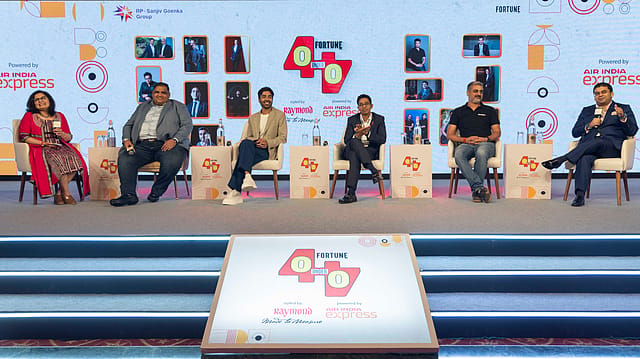Fortune India 40 Under 40 Awards: Legacy next-gen entrepreneurs versus first timers
ADVERTISEMENT

A panel discussion on legacy next-generation entrepreneurs and first timers brought alive various nuances of entrepreneurship, putting a spotlight on the challenges and opportunities faced by both kinds of entrepreneurs at the Fortune India 40 Under 40 Awards ceremony in Mumbai.
The new-age start-up founders are clearly upstarts. Right from the business idea to the way they execute, it's always a clean slate for them. Delhivery started out as a food delivery company as there was a need as a lot of restaurants weren’t delivering food, says Suraj Saharan, co-founder, Delhivery. “We quickly realised that there was a lot of spare capacity in terms of bandwidth with the riders between lunch and dinner because lunch and dinner were busy orders for food and this is when e-commerce was just taking off,” says Saharan.
“To fill that gap, we started doing e-commerce deliveries locally in Gurgaon. The feedback we got was very positive. Companies we worked with said can you please expand this to other cities as well because at that point COD as a concept was unheard of. It was the only driver for e-commerce at that time. When people were not comfortable using credit and debit cards online. So COD was the absolute holy grail of e-commerce. That’s when we decided to shut the food delivery business and said that e-commerce needs a player, if we don’t do somebody else will. That’s how we pivoted. What we thought has turned out to be true,” explains Saharan.
While one tends to believe that since legacy entrepreneurs are born with a silver spoon everything comes easy for them. The reality, however, is that they have to unlearn. They take over businesses which have been around for generations and the challenge is to contemporarise.
“In our business we are working on reinventing ourselves every generation. In my grandfather’s era, it was about the practice of law. We think of ourselves as a professionally run family business. We have around 200 partners out of which around 4-5 are family,” says Rishabh Shroff, partner, Cyril Amarchand Mangaldas.
Failure really is generally essential for anybody to grow, believes Pranav Kapoor, founder and creative director, Pkapo Fragrances. “If you don’t fail, how do you even learn. In D2C there is constant failure, something which B2B doesn’t have where money comes first and everything else starts later. In D2C, you have a big hole in your pocket and you are constantly questioning yourself that why am I doing this? If the wheel is not broken then why am I trying to reinvent it? If you don’t adapt and if you don’t change, how does it sustain in the future. You don’t have the option to fail multiple times,” Kapoor explains.
Abhishek Chakraborty, a second-generation entrepreneur and CEO of DTDC Express, says startup was a bad word when DTDC was founded. “Banks would not give you capital, let alone VCs. India was a fragmented market. We were able to create premiumisation in our business and that really allowed us step away from the rest of the crowd,” says Chakraborty.
For start-ups, the biggest challenge is to make sure they stay afloat. One time where we did not know what was going to happen is when Covid-19 happened," says Ankush Grover, co-founder, Rebel Foods.
“We started with Faasos on high street, then we realised that people don’t know where our store is so we started dark kitchens which were new. My parents said no one is going to order from a place which is not visible,” says Grover, adding that Rebel Foods kept pivoting with the changing times.